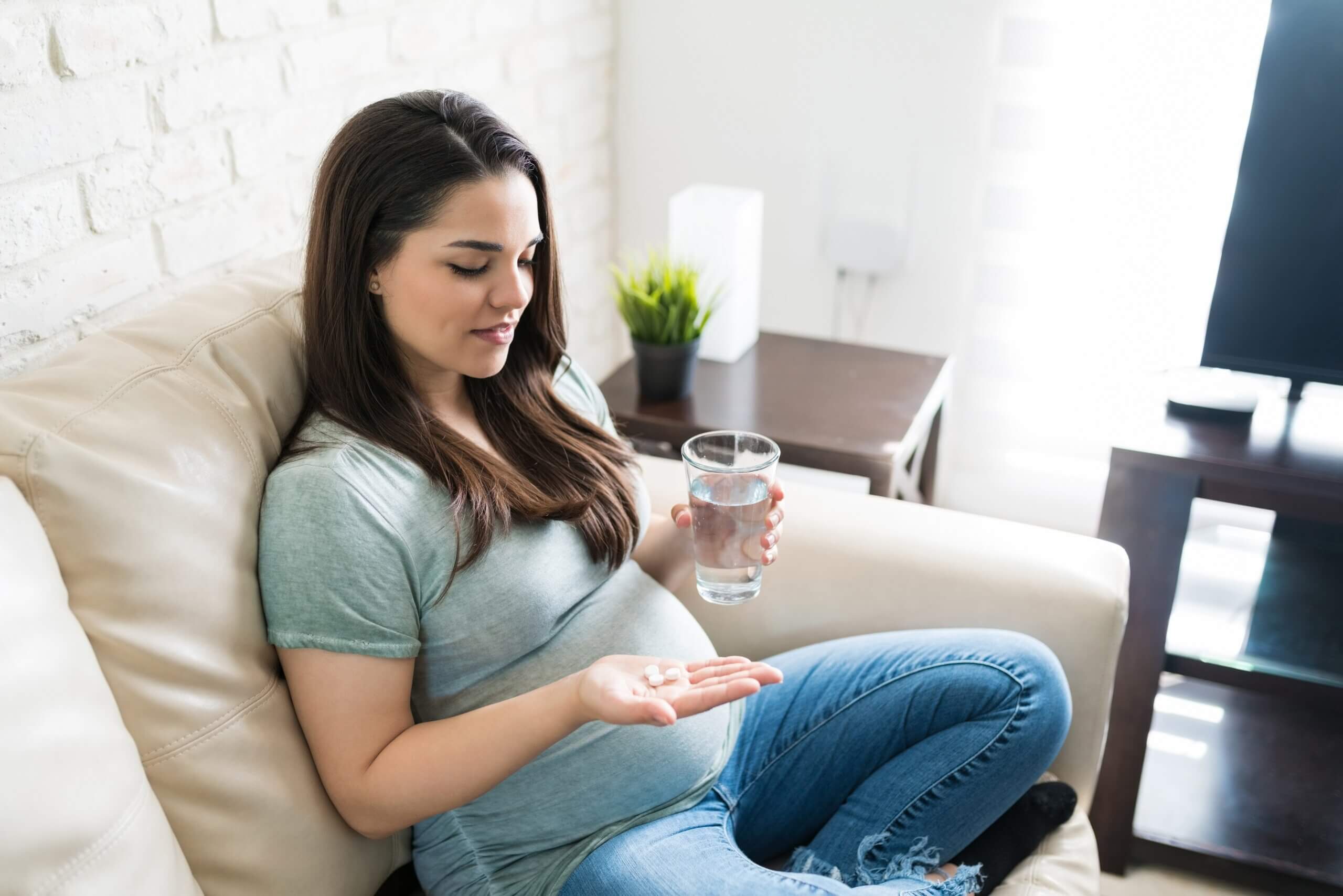How to Treat Anemia During Pregnancy?


Written and verified by the nutritionist Saúl Sánchez Arias
Anemia during pregnancy is a relatively frequent problem that can affect the quality of life, as it produces chronic fatigue and tiredness. For this reason, it’s important to know what strategies can be implemented to prevent and treat anemia.
The first thing we need to make clear is that iron supplementation is generally recommended at the beginning of pregnancy. This way, a higher intake of the nutrient is provided and better assimilation is achieved. Under this context, the risk of a deficit is reduced.
Types of anemia during pregnancy
During pregnancy, 3 types of anemia can be experienced. These are detailed below:
- Gravidic: This is generated from an increase in blood volume.
- Ferropenic: This type of anemia during pregnancy is caused by an inefficient supply of dietary iron.
- Megaloblastic: In this case, it’s a vitamin B12 deficiency that conditions the development of this disease. For this reason, the individual’s diet will have to be adjusted to meet the needs for the nutrient.
Optimize your diet to prevent and treat anemia

It’s common, at the beginning of pregnancy, for an iron supplement to be incorporated into the diet to compensate for the increase in blood volume in the body. However, this may not be sufficient. Therefore, ensuring that elements such as eggs, red meat, and green leafy vegetables appear in the regular diet is very important.
It should be noted that, as a general rule, the absorption of dietary iron is low. However, there’s a way to increase its availability, and that’s through a joint intake of vitamin C. This is evidenced by research published in the journal JAMA. This way, the utilization at the intestinal level will be improved and the risk of iron deficiency anemia will be reduced.
At the same time, it’s also important to ensure the presence of foodstuffs containing vitamin B12 in the diet. Keep in mind that only those of animal origin are those that present this characteristic. Therefore, vegan diets aren’t recommended during pregnancy. In the case of experiencing a deficit of the nutrient, other symptoms may manifest themselves at the neurological level, according to a study published in American Family Physician.
When to go to the doctor
If you feel weakness or tiredness frequently during pregnancy and this problem doesn’t go away in the next few days, it’s a good idea to consult a specialist. It’s always better to prevent anemia than to cure it, as intravenous iron may even be necessary to solve the most extreme cases.
At the same time, restrictive diets should never be considered during pregnancy. Otherwise, not only the correct development of the fetus is put at risk, but also the mother’s health. The requirements of many nutrients are increased at this time. Therefore, meeting them through a diet based on the consumption of fresh foods will always be necessary. In addition, it’s best to avoid low-quality ultra-processed foods.

Do supplements always have to be taken to prevent or treat anemia?
As a general rule, iron and folic acid supplements are usually given to women when pregnancy is detected. This prevents problems in the future development of the baby. In any case, incorporating vitamin B12 supplements isn’t necessary unless an inadequate dietary intake is detected. If the diet contains foods of animal origin, this shouldn’t be necessary.
Anemia in pregnancy: A common problem
As you’ve seen, there are 3 types of anemia in pregnancy that are motivated by different causes. However, in any case, it will be best to adjust your diet to avoid the development of a disease that will condition the mother’s well-being. If in doubt, it’s best to consult a nutrition professional to prevent this problem efficiently.
Finally, keep in mind that during pregnancy, it’s important to promote all healthy lifestyle habits. Simply eating well won’t suffice. Women must also maintain a certain degree of physical activity, be exposed to the sun frequently, and sleep at least 7 or 8 hours every night. This is the only way to ensure the smooth development of the fetus. Avoiding toxic habits will also make a difference.
Anemia during pregnancy is a relatively frequent problem that can affect the quality of life, as it produces chronic fatigue and tiredness. For this reason, it’s important to know what strategies can be implemented to prevent and treat anemia.
The first thing we need to make clear is that iron supplementation is generally recommended at the beginning of pregnancy. This way, a higher intake of the nutrient is provided and better assimilation is achieved. Under this context, the risk of a deficit is reduced.
Types of anemia during pregnancy
During pregnancy, 3 types of anemia can be experienced. These are detailed below:
- Gravidic: This is generated from an increase in blood volume.
- Ferropenic: This type of anemia during pregnancy is caused by an inefficient supply of dietary iron.
- Megaloblastic: In this case, it’s a vitamin B12 deficiency that conditions the development of this disease. For this reason, the individual’s diet will have to be adjusted to meet the needs for the nutrient.
Optimize your diet to prevent and treat anemia

It’s common, at the beginning of pregnancy, for an iron supplement to be incorporated into the diet to compensate for the increase in blood volume in the body. However, this may not be sufficient. Therefore, ensuring that elements such as eggs, red meat, and green leafy vegetables appear in the regular diet is very important.
It should be noted that, as a general rule, the absorption of dietary iron is low. However, there’s a way to increase its availability, and that’s through a joint intake of vitamin C. This is evidenced by research published in the journal JAMA. This way, the utilization at the intestinal level will be improved and the risk of iron deficiency anemia will be reduced.
At the same time, it’s also important to ensure the presence of foodstuffs containing vitamin B12 in the diet. Keep in mind that only those of animal origin are those that present this characteristic. Therefore, vegan diets aren’t recommended during pregnancy. In the case of experiencing a deficit of the nutrient, other symptoms may manifest themselves at the neurological level, according to a study published in American Family Physician.
When to go to the doctor
If you feel weakness or tiredness frequently during pregnancy and this problem doesn’t go away in the next few days, it’s a good idea to consult a specialist. It’s always better to prevent anemia than to cure it, as intravenous iron may even be necessary to solve the most extreme cases.
At the same time, restrictive diets should never be considered during pregnancy. Otherwise, not only the correct development of the fetus is put at risk, but also the mother’s health. The requirements of many nutrients are increased at this time. Therefore, meeting them through a diet based on the consumption of fresh foods will always be necessary. In addition, it’s best to avoid low-quality ultra-processed foods.

Do supplements always have to be taken to prevent or treat anemia?
As a general rule, iron and folic acid supplements are usually given to women when pregnancy is detected. This prevents problems in the future development of the baby. In any case, incorporating vitamin B12 supplements isn’t necessary unless an inadequate dietary intake is detected. If the diet contains foods of animal origin, this shouldn’t be necessary.
Anemia in pregnancy: A common problem
As you’ve seen, there are 3 types of anemia in pregnancy that are motivated by different causes. However, in any case, it will be best to adjust your diet to avoid the development of a disease that will condition the mother’s well-being. If in doubt, it’s best to consult a nutrition professional to prevent this problem efficiently.
Finally, keep in mind that during pregnancy, it’s important to promote all healthy lifestyle habits. Simply eating well won’t suffice. Women must also maintain a certain degree of physical activity, be exposed to the sun frequently, and sleep at least 7 or 8 hours every night. This is the only way to ensure the smooth development of the fetus. Avoiding toxic habits will also make a difference.
All cited sources were thoroughly reviewed by our team to ensure their quality, reliability, currency, and validity. The bibliography of this article was considered reliable and of academic or scientific accuracy.
- Li, N., Zhao, G., Wu, W., Zhang, M., Liu, W., Chen, Q., & Wang, X. (2020). The Efficacy and Safety of Vitamin C for Iron Supplementation in Adult Patients With Iron Deficiency Anemia: A Randomized Clinical Trial. JAMA network open, 3(11), e2023644. https://doi.org/10.1001/jamanetworkopen.2020.23644
- Langan, R. C., & Goodbred, A. J. (2017). Vitamin B12 Deficiency: Recognition and Management. American family physician, 96(6), 384–389.
This text is provided for informational purposes only and does not replace consultation with a professional. If in doubt, consult your specialist.








